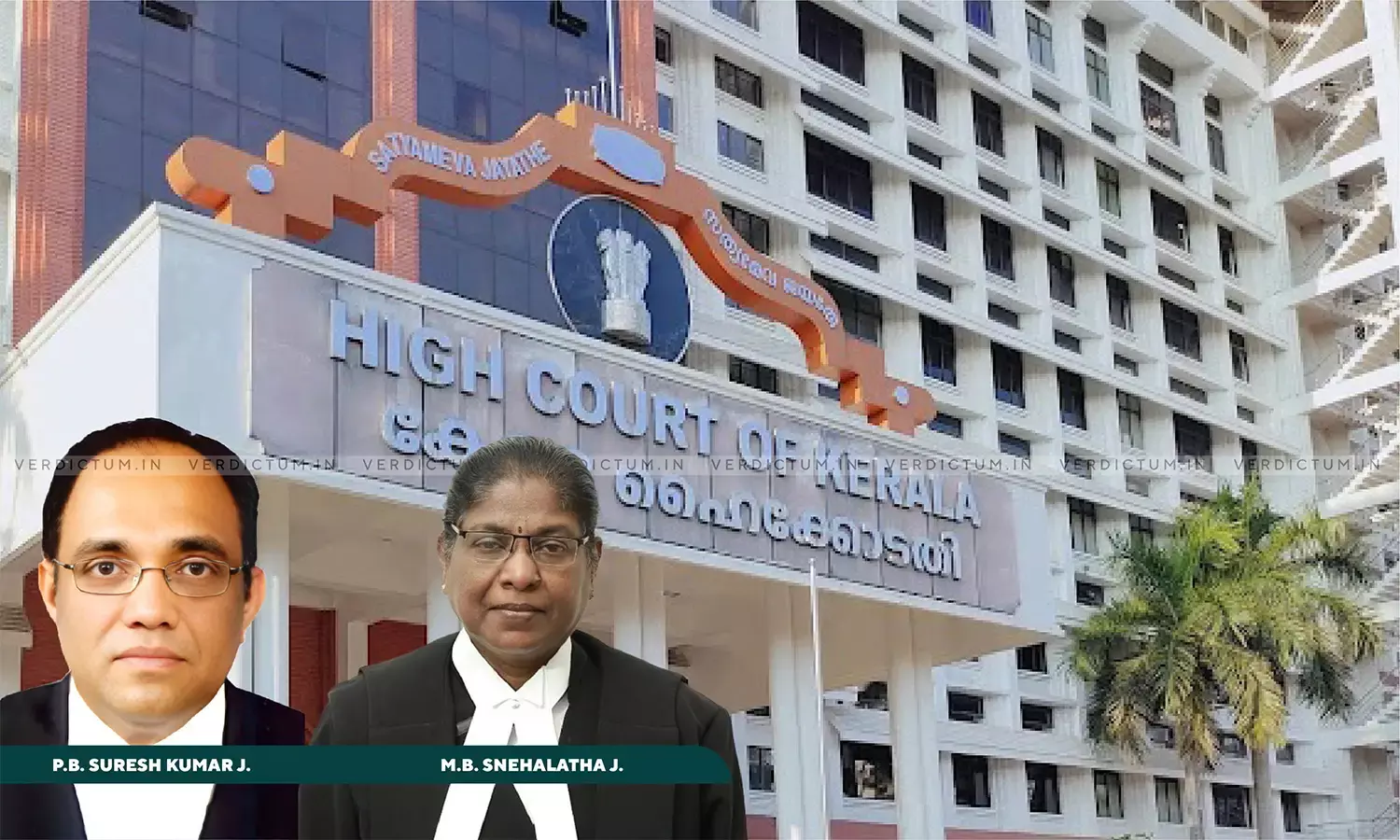"No Parents Would Come Forward With A False Case That Their Unmarried Daughter Was Raped": Kerala HC Upholds Conviction Of Rape Accused
The Kerala High Court upheld the conviction of rape accused and said that no parents would come forward with a false case that their minor daughter was raped.
The Court was dealing with a criminal appeal filed by the accused against the judgment of the Sessions Court by which he was convicted and sentenced for the offences punishable under Sections 450, 376, and 392 of the Indian Penal Code (IPC).
A Division Bench comprising Justice P.B. Suresh Kumar and Justice M.B. Snehalatha remarked, “The contention put forward by the accused that the parents of the girl foisted a false case against the accused since the accused refused to withdraw from the love affair, is devoid of any merit. No parents would come forward with a case of rape just to make a humiliating situation against the honour of the family. Why should a girl of 13 and her family lay false complaint against a person alleging rape without any rhyme or reason and invite dishonour and shame to the family? In the normal course of human conduct, no parents would come forward with a false case that their unmarried daughter was raped.”
Advocate P.K. Varghese represented the appellant/accused while Public Prosecutor Bindu O.V. and Spl. GP Ambika Devi S. represented the respondent/State.
Factual Background -
As per the prosecution case, the appellant/accused who was in acquaintance with the minor victim via ‘Facebook’ alleged to have trespassed into her residence in March 2012 during night committed rape on her. Thereafter, he allegedly sexually abused her on several occasions. He also alleged to have robbed 12 ¼ sovereigns of gold ornaments kept in the almirah of the said house and one ATM Card and misusing the same, he withdrew an amount of Rs. 7,300/- from the account of victim’s mother. In September 2012, when the victim revealed the incident to her mother, she laid an FIR and during the investigation, the accused was arrested.
The accused took up a defence that the victim was in a romantic relationship with him and when their relationship came to the knowledge of the school authorities, the victim was expelled from the school. It was his further case that her parents who did not approve their relationship, foisted such false rape case against him. However, the Trial Court convicted him and sentenced him to undergo imprisonment for life along with a fine of Rs. 5,000/-. Challenging this, he approached the High Court.
The High Court in the above context of the case observed, “Prosecution has succeeded in establishing that on 21.3.2012 accused committed house trespass into the residence of the minor prosecutrix aged 13 and committed rape on her and thereafter during the period from 21.3.2012 to 21.9.2012 he sexually abused her on several occasions. Prosecution has also succeeded in proving that the accused robbed the gold ornaments from the house of the prosecutrix after extorting her. It also stands proved that he also took away the ATM Card of the mother of the prosecutrix and by misusing the same, he stealthly withdrew an amount of ₹7,000/- from the account of PW2.”
The Court said that there is no reason to interfere with the conviction of the accused for the offences under Sections 450, 376, and 392 of IPC.
The counsel for the accused had submitted that the sentence for imprisonment for life awarded by the Trial Court for the offence punishable under Section 376 IPC is harsh and excessive and not proportionate to the crime committed. It was also pointed that prior to the amendment in the year 2013, the minimum sentence prescribed for the offence under Section 376(1) IPC was rigorous imprisonment for either description for a period of seven years and fine and therefore, the counsel urged the Court to show some leniency in the matter of punishment for the offence under Section 376 IPC.
The Public Prosecutor on the other hand submitted that the accused who committed a heinous crime like rape do not deserve any sympathy. The Court in view of this noted –
“It is a well settled principle that in criminal cases, awarding of sentence is not a mere formality and an element of discretion is certainly vested in the court in taking a decision on sentence. The sentence to be awarded will have to be considered in the background of the facts of each case and the court while doing so should bear in mind the principle of proportionality. The sentence awarded should be neither excessively hard nor ridiculously low.”
Furthermore, the Court noted that prior to the amendment of IPC in the year 2013, the minimum sentence prescribed for the offence under Section 376 IPC was imprisonment of either description for a period of seven years and fine. Bearing in mind the said fact and also having regard to the facts and attending circumstances of the case, the Court while confirming the conviction against the accused for the offences punishable under Sections 450, 376 and 392 IPC and confirming the sentence awarded by the Trial Court, concluded that ends of justice would be met by awarding rigorous imprisonment of ten years and imposing a fine of Rs. 50,000/- for the offence punishable under Section 376 IPC instead of imprisonment for life.
Accordingly, the High Court partly allowed the appeal, upheld the conviction, and modified the sentence.
Cause Title- Ratheesh @ Akku v. State of Kerala




